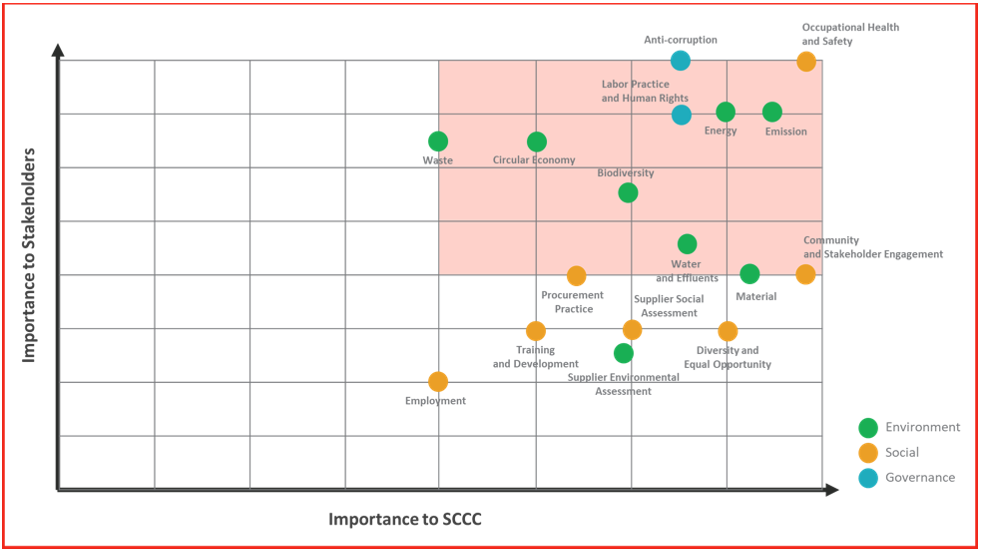ESG Materiality Assessment
SCCC has conducted a comprehensive review of key sustainability issues pertaining to both internal and external business operations. This assessment considered the Company's risks, stakeholder expectations, and prevailing sustainability trends within the construction material industry.
In aligning with best practices, SCCC has implemented principles from prominent frameworks including the Global Reporting Initiative (GRI) Standards 2021, the Task Force on Climate-related Financial Disclosures (TCFD), and the United Nations Sustainable Development Goals (SDGs) to support decision-making in defining and planning policy and sustainability strategies effectively. This analysis ensures that priorities are aligned with stakeholder interests and industry benchmarks.
• Steps of Materiality Assessment and Prioritization
with reference to the GRI Standards (GRI 3: Material Topics 2021) and Integrated Reporting Framework
Step 1: Evaluate sustainability issues throughout the value chain, encompassing raw material sourcing, production, transportation, distribution, product and service usage, and analysis of evolving key trends.
Step 2: Identify current sustainability impacts and future projections through the Sustainability Steering Committee overseen by the Board of Directors.
Step 3: Assess economic, environmental, social, and other effects aligned with the enterprise risk management framework.
Step 4: Prioritize sustainability issues based on their importance to SCCC and stakeholders to determine materiality.
A summary of key sustainability issues will be compared with opinions from internal/external stakeholders, experts from all events and channels i.e., opinion panels and considered against GRI Standards to ensure that the company’s sustainability issues are addressed, comprehensive, reasonable and exhibit little data variance.
Following that, the significant sustainability issues were presented to the Board of Directors for consideration. The Sustainability Steering Committee (SSC), responsible for ongoing assessment of importance, serves as a central point of communication with all departments to develop operational plans aligned with the objectives of each key issue. Additionally, they produce Sustainable Development (SD) performance progress reports for the Board of Directors’ bi-annual review and evaluation.
• SCCC Materiality Topics
SCCC regularly reviews the importance of sustainability issues to align with the direction of business operations with reference to the GRI Standards. SCCC has identified key materiality issues that are significant and areas where focus are needed for SCCC business operations as follows.

The results of our materiality assessment highlight certain issues that are of high importance to both SCCC and our stakeholders, such as Occupational Health and Safety, Emission and Energy. Additionally, some issues are considered critical by stakeholders but are viewed by SCCC as risks that can be effectively managed, controlled, or prevented, such as Supplier Management, Diversity and Equal Opportunity.
Moving forward, SCCC is committed to enhancing our materiality assessment approach to better collect, analyze, and prioritize sustainability issues in the coming year. We aim to ensure that the most pertinent issues, with increased stakeholder input, are accurately reflected. This will contribute to more effective management of material issues.
Furthermore, SCCC will incorporate these issues into our strategic development process and communicate them in reports or media that align with stakeholder interests. This approach reflects our ongoing commitment to sustainability and stakeholder engagement.






